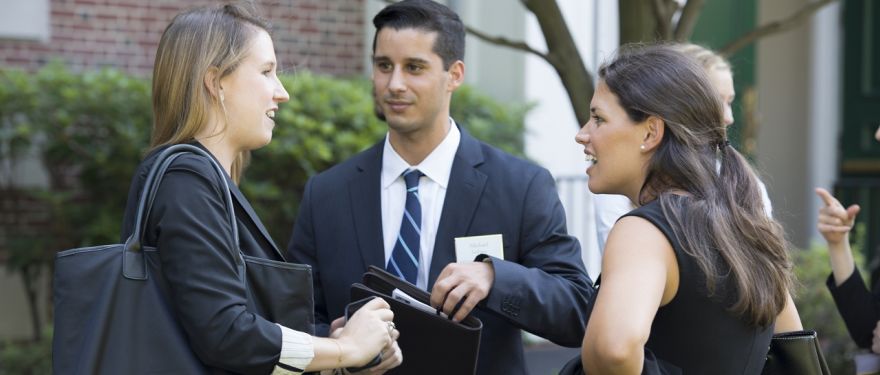As a college student you’re probably thinking about your future, what career path might interest you, whether an MBA might be worthwhile to pursue. For most top MBA programs you’re going to need some work experience before coming to business school - and it’s true all our students have some amount of work experience before HBS. The case method hinges on the fact that our classrooms are full of students with very diverse backgrounds. We have army officers, retailers, engineers, teachers and consultants with years of experience under their belts. The workplace experience they bring to HBS is critical to learning both inside and outside the classroom.
While it may be true you can’t come to HBS straight out of college, you can apply to HBS while still in college. If you get accepted into our 2+2 Program, you’ll defer your place with us for at least two years (and up to four) and go out into the workforce. We checked in with two current students who applied to HBS through 2+2 to find out why they think college students should consider applying through 2+2. Here’s what Lindsay Williams (MBA 2015) and John Jensen (MBA 2015) had to say:
- You have the freedom to pursue your passions for two years before coming to HBS
John: The 2+2 program didn’t “change” my plans, but rather let me focus on what I really wanted to do. Before I had been accepted, I contemplated the traditional banking and consulting opportunities, thinking it was the sure-fire path to business school. But my long-term goals didn’t directly benefit from those roles; I wanted to learn how to lead an innovative organization that was changing an industry. Having business school locked in allowed me to keep my focus on that ambition and to start laying the groundwork for my long-term career. Furthermore, it gave me a bit more comfort with taking the risk of working for a company which most (at the time) thought was destined for failure.
Lindsay: 2+2 really gives students more freedom and flexibility to follow a non-traditional path. Many 2+2ers have been able to start their own companies, work in the public sector, and really explore their options before coming to business school. I think this brings a rich level of diversity to the classroom discussions. - You have the flexibility to extend your time in the workforce before HBS
John: I spent the majority of my pre-MBA time working at Tesla Motors. By the time my first 2 years of post-undergrad work was completed, I realized that I wasn’t quite ready to return to school. There was still a significant amount of learning to be gained from my role and exciting developments at Tesla, so I decided to defer for a third year. In hindsight, taking that third year was incredibly valuable. Participating and drawing from HBS and the case method requires experience and maturity, and three years was the perfect timeframe for me.
Lindsay: I appreciated the ability to extend my deferral; I was able to decide when was the right time to come to HBS and whether I had more growing to do in my job. Were there other cool opportunities there before coming to HBS? I could evaluate multiple options without having to give up a future at HBS. - You’ll connect with fellow 2+2s before coming to HBS and during your time here
John: Our 2+2 class definitely formed a small community right after we graduated from college. We maintained a fairly active email group, updating each other on career changes, asking for help/advice, and planning meet-ups in our respective cities. The community continued when we all arrived at HBS, but was second to the section experience that really defines the program (in a good way). That being said, some of my closet friends and contacts are fellow 2+2ers.
Lindsay: Yes. Unfortunately at the time, there were no other 2+2ers in Cincinnati. However, I was able to visit Boston three times before officially moving to Boston, and, on each of those trips, I met up with 2+2ers to personally interact and learn about their experiences. As an official student on campus, there is a community of 2+2ers, and we meet up a couple times per semester to socialize. We are spread across all sections, so it is great to hear how everyone has developed since starting at HBS. - There are a lot of upsides to putting in an application
John: Take a chance and apply. Don’t let the stereotypes and statistics scare you. When I first contemplated applying, I read all the “Class Profiles,” student backgrounds, and even a number of blogs that highlighted “requirements” that you had to have before you’d even be considered. And I certainly didn’t think I met them. These profiles appeared so daunting that I almost considered not applying. After meeting my peers, however, I was impressed by the diversity of the 2+2 body. Sure, there are pockets of similarities, but there’s a really wide spectrum of interesting backgrounds and awesome experiences. As cliché as it sounds, let your own dreams inspire your application and your career choices. Trying to force yourself into matching the “average candidate” will simply make you look like everyone else while holding you back from what you really want to do.
Lindsay: Do it! First of all, there’s very limited downside. If you do not get in, you have learned more about HBS and the application process and can always re-apply through the standard admissions process at a later point in time. If you get in, welcome to the HBS community! You have flexibility to follow your heart’s desire for a few years with the safety of knowing you have HBS. If you fall in love with what you’re doing, you can defer your admission. Plus, you meet great people throughout the entire journey. Unlimited upside!
Want to learn more? Visit our 2+2 Program page or start your application.

